―
“Sustainable Travel” ― the hot topic after Covid-19
―

(Image source: European Travel Commission)
Over the past two and a half years, the world has been hit hard by the coronavirus. Covid-19 has had such a huge impact on our lives that it is difficult to find places whose economy, health, and education and all else that have not been impacted.
The tourism sector has suffered as much damage as any other sector. According to the World Tourism Organization (UNWTO) "International Tourism and Covid-19" data, global tourists decreased by 1 billion in 2021 as compared to 2019, and there has been a loss on the order of 1 trillion dollars in the tourism sector alone.
According to the European Travel Commission (ETC), the number of tourists worldwide fell by 83% in 2020 compared to 2019. Indeed, the setback is enormous. You can imagine what difficult times the countries that make their living from tourism have had to go through.
https://www.unwto.org/tourism-data/international-tourism-and-covid-19
Ironically, there are some areas that are concerned about an increase in tourists. Venice, Italy is famous for being the city of water. Why is Venice concerned about the rise in tourists?
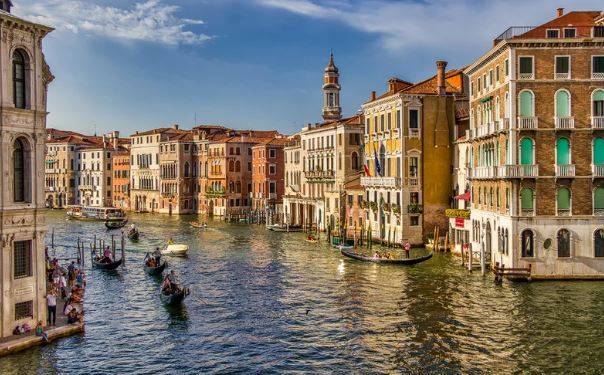
Venice has an estimated population of 150,000. With 30 million people visiting the city every year before Covid-19, environmental damage and nuisance to residents became an issue.
In response, the city of Venice is limiting the number of visitors to 40,000 to 50,000 per day through reservations. And from next year, there will be an entrance fee of about 10 euros per person.
―
Sustainable Tourism
―
Sustainable tourism has become a hot topic in the tourism industry after Covid-19. Which factors would make a travel sustainable?
The United Nations World Tourism Organization (UNWTO) defines sustainable tourism as "tourism that takes full account of its current and future economic, social and environmental impacts, addressing the needs of visitors, the industry, the environment and host communities."
https://www.unwto.org/sustainable-development
In detail, it should contain three elements: environmental sustainability, social and cultural sustainability, and economic sustainability.
1. Environmental sustainability: optimal use of the environmental resources that constitute a key element of tourism development, maintaining essential ecological processes, and preserving natural heritage and biodiversity
2. Socio-cultural sustainability: respecting the socio-cultural authenticity of the host region, preserving the cultural heritage and traditional values they have built and are living, and contributing to intercultural understanding and tolerance
3. Economic sustainability: ensuring viable and long-term economic operation by contributing to alleviating poverty and providing social and economic benefits that are fairly distributed among all stakeholders, including stable employment and income-generating opportunities, and social services to host communities
―
12 Tips for Sustainable Tourism
―

https://news.un.org/en/story/2022/10/1129247
Recently, the United Nations has proposed 12 tips to sustainable travel. The UN states that sustainable travel helps reduce global poverty without negatively impacting the environment.
1. Use reusable plastic containers
Plastics are often used for less than 15 minutes but take more than 1000 years to decompose. Use reusable bottles and bags wherever you go.

2. Use water wisely
Tourists usually consume much more water than locals. Simply refraining from changing your sheets and towels daily during your hotel stay can save millions of gallons of water each year.
3. Buy local products
Buying locally bolsters the local economy and reduces the carbon footprint of transporting goods.

4. Choosing an Ethical Travel Agent
If you use a travel agency, you should choose a travel agency that prioritizes the environment, uses resources efficiently, and respects local culture.
5. Please do not feed wild animals
The more you come into contact with wild animals, the more likely you are to spread human disease to them, and as the wild animals become accustomed to receiving food from humans, they may become dependent on humans for survival.
6. And don't eat them either
Demand for wildlife increases poaching and exploitation of endangered animals. When shopping for souvenirs, avoid products made from endangered wildlife.
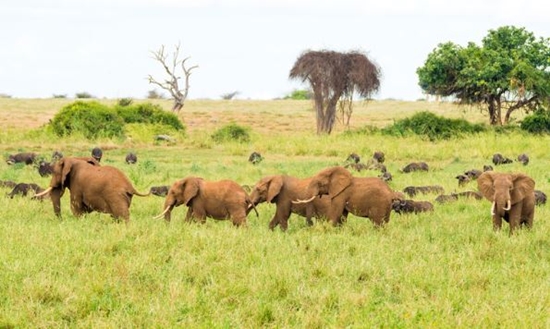
7. Ride sharing
Transportation is a major source of carbon emissions from tourism. Use public transport or bicycles instead of taxis.

8. Homestay
Staying with locals and their families provides an opportunity for travelers to see different ways of life while contributing to their income.
9. Do your homework
Studying your destination before you go there will allow you to better immerse yourself in local traditions and practices and appreciate features of the culture and geography you might not otherwise know.
10. Visit National Parks and Reserves
Visit national parks to learn firsthand about animals and ecosystems. Entrance fees also support efforts to conserve natural habitats.
11. Leave no trace
Do not remove or change anything without permission. Let's leave only soft footprints.

12. Tell your friends
Tell your fellow travelers, friends and family about how sustainable tourism helps to improve the livelihood and well-being of local people.
―
Glasgow Declaration on Climate Action in Tourism
―
At the United Nations Climate Change Conference in 2021 (COP21), the Glasgow Declaration on Climate Action in Tourism was announced to respond to concerns about the effects of tourism on climate crisis.
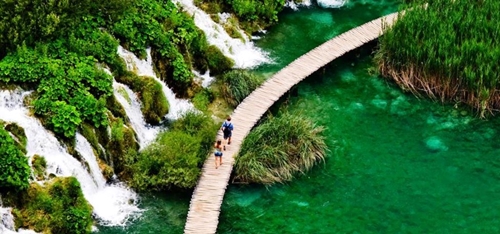
https://www.unwto.org/the-glasgow-declaration-on-climate-action-in-tourism
More than 530 organizations, including major countries and corporations, participated in the declaration, and signatories agree to the following commitments: ▲ halve harmful emissions from tourism by 2030 ▲ reach Net Zero as soon as possible before 2050 ▲ report publicly on the progress and actions being taken on an annual basis
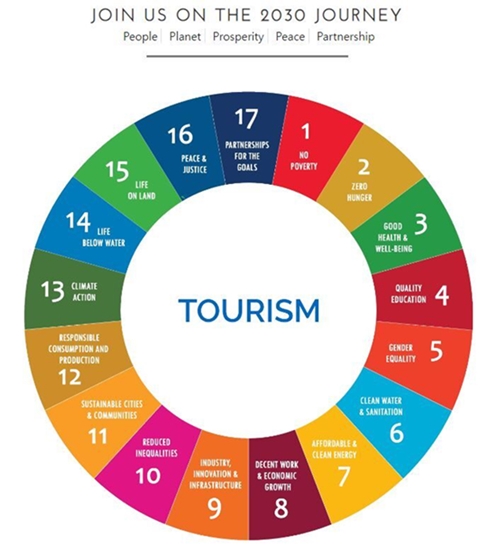
―
Tourism-related Transport
―
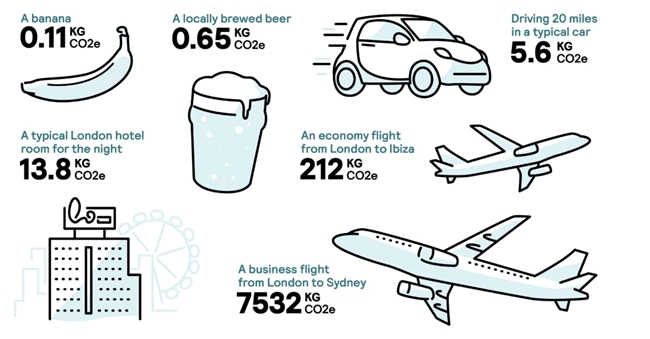
(Source: travalyst)
It is known that tourism accounts for about 8% of global carbon emissions. According to data released by the World Tourism Organization in December 2019, tourism-related carbon dioxide emissions are expected to increase by 25% by 2030 compared to 2016.
The report predicts that carbon emissions related to tourism-related transport will increase by 45% for international travel and 21% for domestic travel in 2030 compared to 2016.
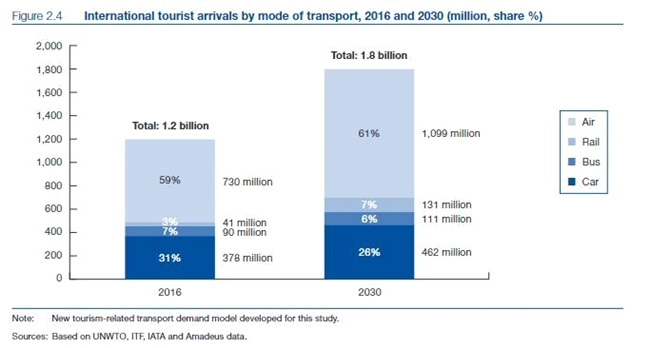
https://www.unwto.org/sustainable-development/tourism-emissions-climate-change
Thankfully, the aviation industry is actively discussing the use of Sustainable Aviation Fuel (SAF). SAF makes use of used cooking oil, algae, and waste products as raw materials. The SAF industry estimates that it can reduce greenhouse gas by up to 80% compared to conventional aviation fuel. In April 2021, the European Commission also announced that all flights departing from Europe would use as fuel a blend of conventional jet fuel and SAF.

(Image source: Greenaironline.com)
At the UN Climate Change Conference last year, UN Secretary-General Antonio Guterres said: “Tourism practices should be aligned with the Sustainable Development Goals and a 1.5-degree future.” He emphasized, “The very survival of this industry, and many tourist destinations, such a Small Island Developing States, depends on it.”
We should be aware that a vacation we take can be a matter of survival for the islanders facing climate crisis. The next time we travel, let’s remember the tips for sustainable tourism.
Written by Sharon Choi
Director of Planning
Sunhak Peace Prize Secretariat

